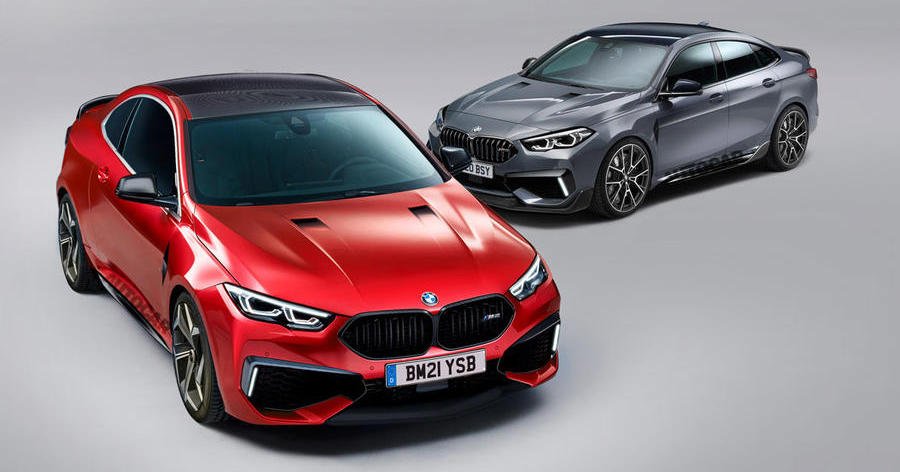The second-generation M2 coupé, which takes the internal codename G87, is scheduled to go on sale in the UK in 2022. It will bring with it a detuned version of BMW M’s latest six-cylinder petrol engine, sourced from the soon-to-be-revealed new M3 and M4 and the recently introduced X3 M and X4 M.
This twin-turbocharged 3.0-litre petrol unit, dubbed S58, replaces the similarly configured S55 used by the current M2 and promises the same high-revving characteristics, with a redline of 7200rpm.
Nothing is official at this early stage, but insiders hint that the S58 will be tuned to provide the new junior M car with at least 420bhp in standard form – a 16bhp increase over today’s M2 Competition – to top the 416bhp of the turbocharged 2.0-litre four-cylinder engine in the Mercedes-AMG A45 S.
Together with 406lb ft of torque, this should ensure off-the-line performance is on par with, if not better than, that of its predecessor, despite an incremental increase in weight due to slightly larger dimensions. Its 0-62mph time should be in the low four-second bracket and its top speed close to 175mph when configured with a final drive ratio similar to today’s M2.
The basis for the new M2 is the forthcoming second-generation 2 Series Coupé, itself heavily related to the third-generation Z4 and its Toyota GR Supra sibling.
Due to reach showrooms in 2021, the new 2 Series Coupé, known internally by the codename G42, takes a different technical route to the new 2 Series Gran Coupé by adopting the latest evolution of BMW’s Cluster Architecture (CLAR) platform. This ensures the future M2 will have a similar mechanical layout to today’s model, with a longitudinal engine mounting instead of the transverse layout of its four-door M235i xDrive Gran Coupé sibling, which is based on BMW’s Front Architecture (FAAR) platform.
The adoption of the CLAR platform also future-proofs the M2 by providing it with the basis for a 48V electrical architecture, which is crucial for such features as throttle-off engine idling, regenerative braking and the option of an electric boosting function.
The new M2 is expected to go without mild-hybrid electric boosting at launch. However, with BMW’s M division already well advanced on such a system for the S58 engine, it could be incorporated during the car’s planned seven-year life cycle.
Autocar sources suggest all future M models will eventually receive mild-hybrid technology as part of BMW’s plans to lower its fleet average CO2 figure.
As with today’s model, BMW plans to offer the new M2 with a six-speed manual gearbox and an electronically controlled Active M Differential. There will also be the option of an eight-speed torque-converter automatic gearbox, which would be crucial if the car is to receive a mild-hybrid system. This will replace the current M2’s dual-clutch automatic, matching developments elsewhere in the BMW M range.
“We have some markets that are calling for an automatic option, but the overwhelming majority of our customers continue to see the manual gearbox as a must-have feature,” a BMW M source told Autocar.
As with the current M2, a number of traditional M division developments will elevate the new model above regular 2 Series Coupé variants. These include additional stiffening measures by way of suspension-strut tower-mounted beams front and rear, dynamic engine mounts and a wider track, the last of which again has necessitated new bodywork.
Despite the M division’s move to provide other recent M models with fully variable four-wheel drive, Autocar sources said the new M2 will retain rear-wheel drive exclusively as part of plans to pitch it as a puristic, circuit-bred model in the best of BMW tradition.
“It’s part of what makes the M2 unique in its market segment,” said an insider. “It’s also what our customers have come to expect from BMW M: a pure and undiluted driving experience.”
The decision to stick with rear-wheel drive will give the M2 a unique selling point in a market now dominated by four-wheel-drive rivals, including performance hatchbacks such as the Audi RS3 and Mercedes-AMG A45 S. And although the Porsche 718 Cayman is considered a competitor to the new BMW, its engine is mounted in the middle, rather than up front.
Aesthetically, the new M2 is said to draw heavily on the M235i xDrive Gran Coupé for inspiration. The two are said to share similar front-end styling, most notably in the shape of the grille and headlights. However, the longitudinal engine in the new M2 dictates a longer bonnet and a more cab-rearward profile than its transverse-engined four-door relation.
As with the original M2, the new model is scheduled to be assembled alongside standard versions of the second-generation 2 Series Coupé and the third-generation Z4 at BMW’s factory in Leipzig, Germany, for the British market. Plans also exist for the model to be built alongside the latest 3 Series at BMW’s new San Luis Potosí site in Mexico for other selected markets, including North America.
Autocar also understands the M2 will eventually be joined by a four-door namesake, despite previous reports to the contrary. Rivalling the Mercedes-AMG CLA 45 and forthcoming new Audi RS3 Saloon, the M2 Gran Coupé will get around 400bhp from a highly tuned version of the M235i Gran Coupé’s four-cylinder engine and have fully variable four-wheel drive.
That unit will also transfer into the most powerful 1 Series hatchback yet, which will sit above the 302bhp M135i. It’s not clear what name this new flagship will take. M1 is considered holy ground, having been used on the first bespoke road-going M car back in 1978, and 1M was the widely used nickname for the limited-run 1 Series M Coupé of 2011.
The new M versions of the 1 Series and 2 Series will complement a successor to the rear-wheel-drive M240i Coupé, giving BMW a diversified line-up of both four- and six-cylinder junior performance cars for years to come.
Related News



